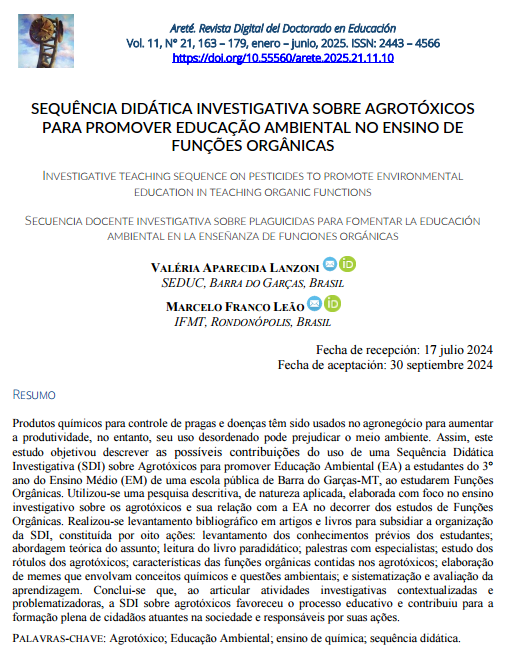Sequência Didática Investigativa sobre Agrotóxicos para promover Educação Ambiental no ensino de Funções Orgânicas
Keywords:
Pesticides, Environmental education, chemistry teaching, following teachingAbstract
Chemicals to control pests and diseases have been used in agribusiness to increase productivity, however, their disordered use can harm the environment. Thus, this study aimed to describe the possible contributions of using an Investigative Didactic Sequence (SDI) on Pesticides to promote Environmental Education (EE) to students in the 3rd year of High School (EM) at a public school in Barra do Garças-MT, when studying Organic Functions. A descriptive research of an applied nature was used, designed with a focus on investigative teaching about pesticides and their relationship with AE during studies of Organic Functions. A bibliographical survey of articles and books was carried out to support the organization of SDI, consisting of eight actions: survey of students' prior knowledge; theoretical approach to the subject; reading the textbook; lectures with experts; study of pesticide labels; characteristics of organic functions contained in pesticides; creation of memes involving chemical concepts and environmental issues; and systematization and assessment of learning. It is concluded that, by articulating contextualized and problematizing investigative activities, the SDI on pesticides favored the educational process and contributed to the full formation of citizens active in society and responsible for their actions.
Downloads
References
Andrade, M. M. (2001). Introdução à metodologia do trabalho científico: elaboração de trabalhos de graduação (5th ed.). Atlas.
Beltran, M. H. R. & Klautau, F. D. (2020). CTSA na História: Discutindo Agrotóxicos à Luz da História da Ciência. Revista da Sociedade Brasileira de Ensino de Química (ReSBEnQ), 01, e012003. http://sbenq.org.br/revista/index.php/rsbenq/article/view/8
Bardin, L. (2016). Análise de Conteúdo. Edições 70.
Carvalho, A. M. P. (Ed.). (2013). Ensino de ciências por investigação: condições para implementação em sala de aula. Cegage Learning.
Carvalho, A. M. P. (2021). Ensino por investigação: As pesquisas que desenvolvemos no LaPEFF. Experiências em Ensino de Ciências, 16(3). https://fisica.ufmt.br/eenciojs/index.php/eenci/article/view/996/880
Demo, P. (1983). Introdução à metodologia da ciência. Atlas.
Franco, M. A. S. (2005). Pedagogia da pesquisa-ação. Educação e Pesquisa, 31(3), 483-502. http://www.revistas.usp.br/ep/article/view/27991
Gil, A. C. (2010). Como elaborar projetos de pesquisa (5th ed.). Atlas.
Köche, J. C. (2011). Fundamentos de metodologia científica: teoria da ciência e iniciação à pesquisa (34th ed.). Vozes.
Lakatos, E. M. & Marconi, M. A. (2018). Fundamentos metodologia científica (8th ed.). Atlas.
Leão, M. F. (2014). Ensinar Química por meio de alimentos: possibilidades de promover alfabetização científica na educação de jovens e adultos. [Dissertação – Mestrado - Curso de Ensino], Universidade do Vale do Taquari - Univates. http://hdl.handle.net/10737/811
Marques, R. & Xavier, C. R. (2020). Alfabetização científica no ensino de ciências: numa sequência didática sobre a pegada ecológica do lixo. Revista de Ensino Ciências e Matemática (REnCiMa), Edição Especial 11(2), 84-106. https://revistapos.cruzeirodosul.edu.br/index.php/rencima/article/view/2504
Mezalira, S. M. et al. (2021). O tema agrotóxico no contexto escolar: o caso de uma escola pública de Sinop/MT. Revista Insignare Scienticia, Edição especial, 4(2). https://lume.ufrgs.br/bitstream/handle/10183/220917/001125501.pdf?sequence=1
Pignati, W. A. et al. (2017). Distribuição espacial do uso de agrotóxicos no Brasil: uma ferramenta para a Vigilância em Saúde. Ciência & Saúde Coletiva, 22 (10): 3281-3293. https://scielosp.org/article/csc/2017.v22n10/3281-3293/
Quidigno, R. A. F. et al. (2021). Uma proposta de sequência didática sobre agrotóxicos fundamentada na abordagem de controvérsias sociocientíficas e na teoria das situações didáticas. Revista de Educação Ciência e Tecnologia, 10(2). https://periodicos.ifrs.edu.br/index.php/tear/article/view/5120
Richardson, R. J. (2017). In: Dietmar Klaus Pfeiffer (Ed.). Pesquisa social: métodos e técnicas (4th Rev. ed.). Atlas.
Schneuwly, B. & Dolz, J. (2011). Roxane Rojo, Glaís Sales Cordeiro (Eds.). Gêneros Orais e escritos na escola (3th ed.). Mercado das Letras.
Thiollent, M. (2002). Metodologia da pesquisa-ação (11th ed.). Cortez.
Tozoni-Reis, M. F. C. (2008). Pesquisa-ação em Educação Ambiental. Pesquisa em Educação Ambiental, 3(1), 155-169. https://www.revistas.usp.br/pea/article/view/30044
Zowada, C., Frerichs, N., Zuin, V. G. & Eilks, I. (2020). Desenvolvendo um plano de aula sobre agrotóxicos convencionais e verdes no ensino de química: um projeto de pesquisa-ação participativa. Pesquisa e Prática em Educação Química, Edição 1, 141-153. https://pubs.rsc.org/en/content/articlehtml/2020/rp/c9rp00128j?page=search

Published
How to Cite
Issue
Section
License
Copyright (c) 2024 Valéria Aparecida Lanzoni, Marcelo Franco Leão

This work is licensed under a Creative Commons Attribution-NonCommercial-ShareAlike 4.0 International License.
This journal provides free, immediate access to its content under the principle of making research freely available to the public, which fosters a greater exchange of global knowledge.
Authors who publish in Areté, Revista Digital del Doctorado en Educación, agree to the following terms:
- Authors retain copyright and grant the journal the right to be the first publication of the work, as well as licensed under a Creative Commons Attribution License that allows others to share the work with an acknowledgement of authorship of the work and initial publication in this journal.
- Authors may separately establish additional agreements for the non-exclusive distribution of the version of the work published in the journal (for example, placing it in an institutional repository or publishing it in a book), with an acknowledgement of its initial publication in this journal and not to be used for commercial purposes.
- The contents and images included in the articles are the responsibility of the author(s). Areté, Revista Digital del Doctorado en Educación, is not responsible for the information included in them.
- Authors agree with the license of use used by the journal, with the self-archiving conditions and with the open access policy.
- Authors are allowed to disseminate electronically (e.g., in institutional repositories or on their own website) the published version of their work, as it favors its earlier circulation and dissemination and thus a possible increase in its citation and reach among the academic community.
- In case of reuse of published works, the existence and specifications of the license of use must be mentioned, as well as the authorship and original source of publication.






